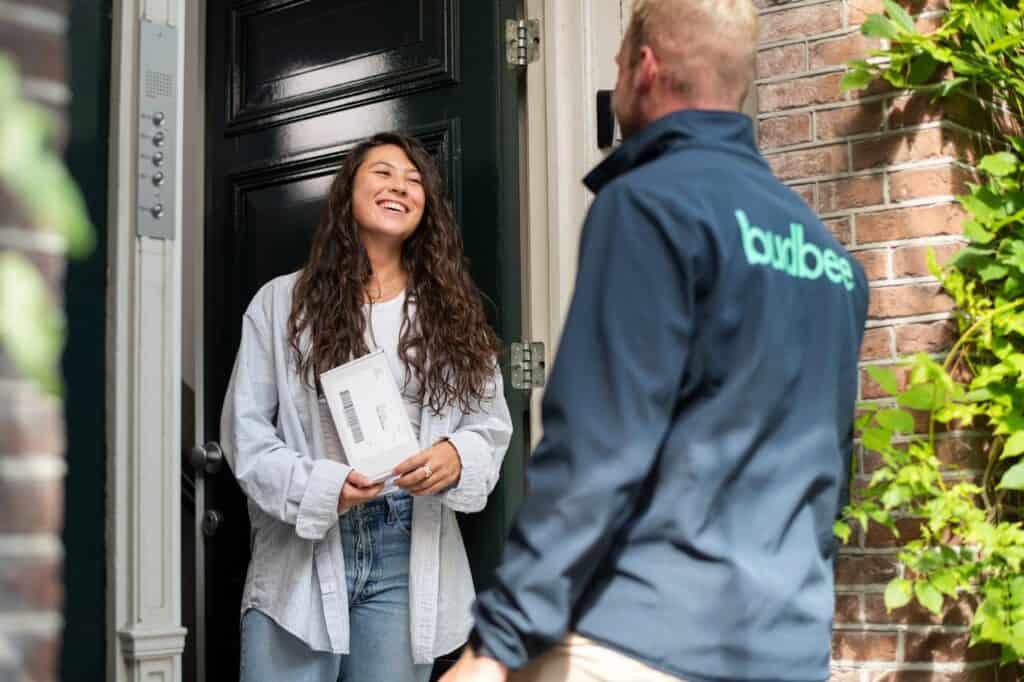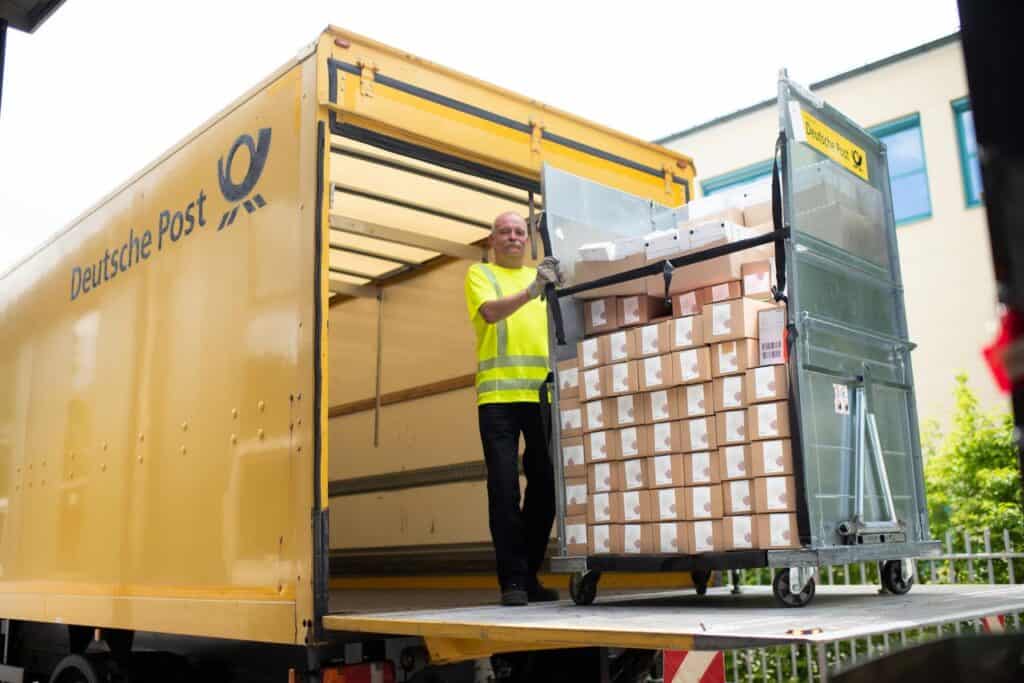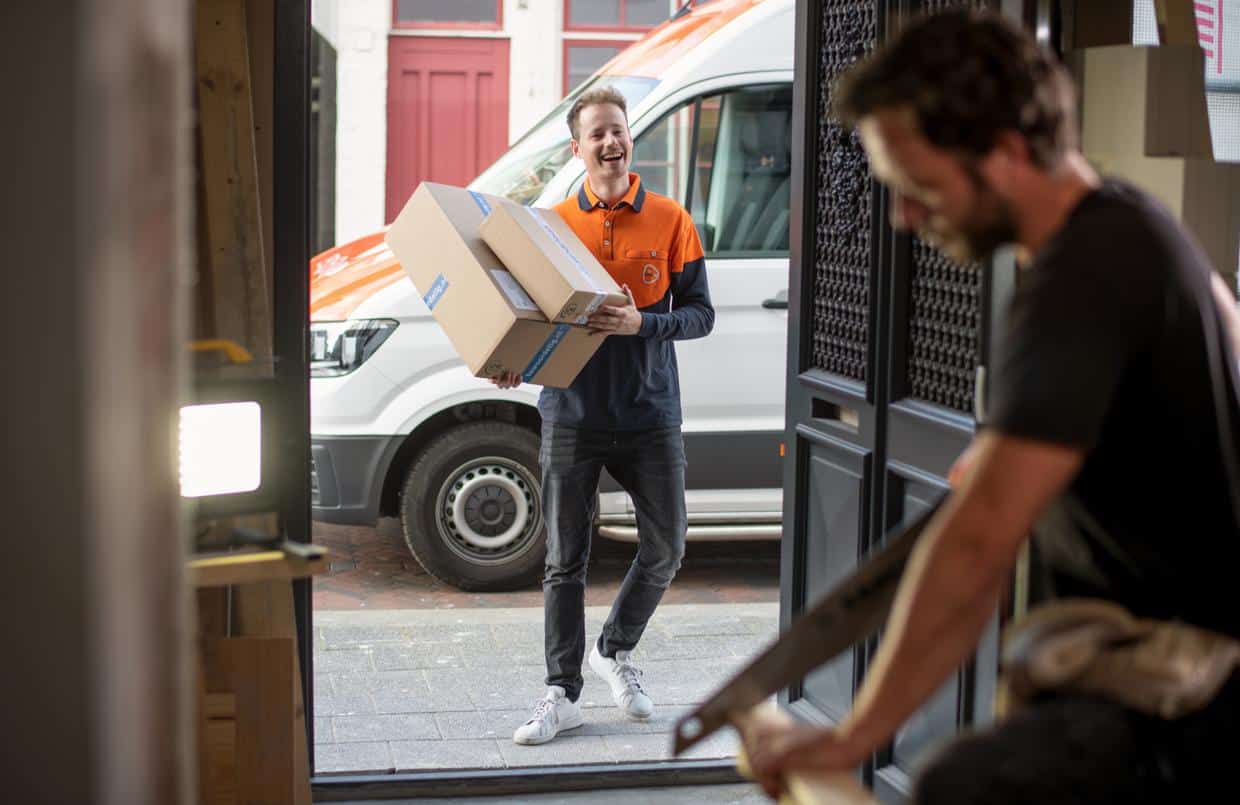As an experienced e-commerce business owner, you’re probably well aware that last-mile delivery is the final – and the most critical – stage of your package’s journey.
As more and more shoppers turn to online buying, the pressure is on for last-mile delivery providers to meet rising expectations and ensure speedy, efficient, and accurate delivery.
And let’s be real, we’ve all been there, anxiously refreshing the tracking page or peeking out the window to catch a glimpse of the delivery truck.
With so much on the line, it’s no wonder that last-mile delivery has become the hottest topic in e-commerce logistics.
In this blog, we’ll delve into the challenges of this crucial phase and share tips on how to optimize it for an unforgettable delivery experience.
We’ll cover:
- What is last-mile delivery?
- What challenges do businesses face with their last-mile delivery?
- How to optimize last mile logistics with 5 strategies
- Profiting from a multi-carrier strategy
What is last-mile logistics or the last-mile problem?
As the name implies, last-mile delivery is the final stretch of the delivery process, where your precious goods are transported from the local hub straight to consumers’ doorstep. And boy, is this part of the journey troublesome – it’s often the most expensive and time-consuming leg of the trip and therefore the most challenging part of the logistics chain.
And with customers demanding lightning-fast and ultra-convenient delivery options, the pressure is on for retailers to step up their last-mile game. After all, a seamless and satisfying customer experience is the key to retaining loyal customers and staying ahead of the pack.

What challenges do businesses face with their last-mile delivery?
Despite its seemingly simple definition – delivering packages from the local hub to the customer’s doorstep – last-mile delivery can be one of the biggest headaches for any online business, big or small. It’s like the final boss battle of the fulfillment journey.
So let’s take a closer look at some of the common challenges:
High costs
If you thought the costs of running an e-commerce store were already sky-high, hold on to your hats – last-mile delivery can eat up a whopping 30% of your logistics budget!
That’s why it’s crucial to implement efficient last-mile logistics solutions to keep your costs under control and stay competitive in the cutthroat e-commerce world.
But watch out – failing to follow the shipping conditions for your courier and delivery method can land you in some serious hot water. Think fuel surcharges, extra fees, and other pesky add-ons that can put a real dent in your profits.
And don’t even get us started on the unpredictable transport routes that can throw a wrench in your delivery plans and add more costly mileage to the equation.
Sustainability and the European Green Deal
In today’s world, where environmental concerns are top of mind, you simply can’t afford to ignore the damage last-mile delivery can have on the world.
Europe is leading the charge with its ambitious environmental targets, including a 55% reduction in carbon dioxide emissions by 2030 and the total neutralization of CO2 emissions by 2050. It’s clear that the future is green – and sustainable deliveries are no longer a nice-to-have, but a must-have in the e-commerce landscape.
But it’s not just the regulations that are changing – consumers are also demanding eco-friendly delivery options from online stores. In fact, according to the latest E-commerce Consumer Research by Sendcloud, a whopping 54% of online shoppers expect e-commerce businesses to offer CO2-free delivery methods.
And if you’re thinking of sitting this one out, think again. Businesses that fail to adapt to this new paradigm risk being left in the dust.
By embracing sustainable delivery practices, e-commerce stores can not only meet their customers’ expectations but also reduce their carbon footprint and contribute to a greener future. So let’s roll up our sleeves and get ready to green up that last mile!
Customer expectations and failed deliveries
If there’s one golden rule in the world of e-commerce (and in any other business field, for that matter), it’s that you must deliver on your promises. If your online store can’t live up to strict delivery deadlines, then don’t make them in the first place. Customers appreciate flexibility, but they value professionalism even more.
In today’s fast-paced world, customers expect lightning-fast delivery times, especially during special occasions such as Christmas. According to our E-commerce Study, a whopping 41% of respondents desire express delivery services for all online orders.
By taking advantage of the conveniences offered by last-mile deliveries, you can enhance the options and shipping times available to your customers. However, before taking the plunge, be sure to analyze both your own capabilities and those of the transportation company, to avoid creating unrealistic expectations for your customers.
5 strategies to optimize the last mile in delivery
Enough about the theory, it’s time to take action. Your customers don’t like to be waiting for their orders.
There are no magic formulas to make this last link in the distribution process always a success, but here are five strategies for your e-commerce business.
1: Leverage technology to streamline logistics
By implementing technology such as parcel optimization or real-time package tracking, you can reduce the time and cost associated with last-mile delivery. Multi-carrier parcel management solutions offer several tools and features that optimize the final part of delivery. Even though carriers are in charge, you can streamline a part on your end too.
Shipping software but also carriers keep developing their services. So once you found the right solution that matches your business goals, you can leave the shipping expertise to the technology and focus on growing your business.
Here’s an overview of a few of the latest technologies to optimize the last mile:
- Route optimization software uses advanced algorithms and machine learning techniques to focus on optimizing delivery routes by taking into account traffic conditions, delivery time windows, and the capacity of the carriers.
- Shipping platforms provide full visibility and control over the entire delivery process. Real-time tracking of shipments helps to efficiently dispatch orders, provide automatic proof of delivery and automatically give alerts to consumers about the status of their orders. This will enable you do reduce WISMO significantly.
- GPS trackers are increasingly used to monitor and track shipments.
- Predictive analytics analyze historical data and other relevant factors to build algorithms to forecast and optimize resources. By predicting potential delays or bottlenecks it enables you to anticipate in time and switch delivery methods or carriers where needed.

2: Partner with local carriers
Partnering with local carriers can help you to more efficiently and effectively deliver products to customers. Local carriers are often better equipped to handle the challenges within a specific region of last-mile delivery. You can think of navigating crowded urban areas or delivering to remote locations. Additionally, working with local carriers can help you to build stronger relationships with your customers by providing more personalized and fast delivery services.
On top of that, 40% of consumers say that they have a strong preference for a specific carrier and most often the local carrier is preferred. Integrating with each new carrier is time-consuming and very costly. Therefore, it’s crucial to set up the right carrier mix.
A practical way of implementing local carriers when operating internationally can be by using a 3PL partner.
Let’s look at Smartphonehoesjes.nl as best practice. The online store connects its WMS to Sendcloud and together with 3PL-partner We Grow Webshops, the brand offers 9 different carriers for domestic and international shipping, handling millions of packages a year.

3: Offer multiple and flexible delivery methods
This strategy is definitely nothing new, but often overlooked. You can cater to the specific needs and preferences of your customers by offering choices within the checkout. Why offer multiple payment methods and just one delivery option?
Online shoppers have different preferences when it comes to delivery methods. Did you know that French consumers have a strong preference for delivery to service points while Spanish consumers prefer cash-on-delivery? Check out the latest e-commerce statistics and implement them for your business.
Fast delivery methods like same-day, next-day, or day-specific delivery options are becoming more adopted in different countries and more carriers arise. Ever thought of the fact that delivery to service points is more sustainable?
Shipping platforms like Sendcloud easily enable you to add multiple delivery methods to your checkout, while simultaneously optimizing the process in the back. Whether you only sell locally or all over the world, different (inter)national carriers can enable you to offer flexible delivery.
Last but not least, multiple delivery options can help you to ensure that your customers receive their orders in a timely and convenient matter. Go get those 5-star reviews!
Flexibility is everything when it comes to shipping in Europe and the UK. Trying to reach all customers via one carrier is not competitive or financially viable. With the added range of carriers that Sendcloud brings, our customers will benefit from the most cost competitive options on the market. – Enda Bresline | GM for Europe – ShipBob
4: Connect with your customers
The lack of information generates a lot of uncertainty for your customers. Spare them unnecessary anxiety and use all the channels at your disposal to maintain direct and transparent communication. Automatic shipping status updates, automated messages, and package or delivery time tracking will enhance the shopping experience at this sensitive point in the process.
Shipping tracking has other benefits for your e-commerce, not just improving the shopping experience. With proper and personalized monitoring you can:
- Reduce the number of returns ensuring successful delivery.
- Reduce the burden of customer service.
- Increase cross-selling and retention rate.
Sendcloud’s customers Custo Barcelona increased the retention rate by 36% thanks to a branded follow-up, integrating social networks into them, and even with banners with special offers. In this way, the customer remains connected and in communication with the brand.

5: Implement a returns management strategy
Returns are an inevitable part of e-commerce, but they can be a major challenge for last-mile delivery. By implementing a returns management strategy, you can help to minimize the cost and complexity of returns, while also providing a better customer experience.
This might include offering free or paid returns, providing pre-printed return labels, or offering different ways of international returns to facilitate faster and more efficient returns processing.
Did you know that with Sendcloud’s return solution, you can set up return rules? You decide when returns are accepted and under what terms. This way you can optimize it for your own business, but enable your customers a friendly and hassle-free policy. It will help to streamline the last-mile for all parties involved.
Key to success: a multi-carrier strategy
The rise of local and last-mile carriers is yet another example of the transformation that e-commerce is undergoing in terms of distribution. With online purchases becoming more and more integrated into our routines, both carriers and online retailers need to increasingly become creative and efficient in their delivery processes.
We must meet the current and future challenges of fast and flexible delivery as an essential part of their growth. Have you stopped to think if you meet all of those requirements?
Sendcloud can help you do so by integrating last-mile delivery strategies into your logistics so that you too can benefit from the latest developments. By implementing multiple and local carriers with a single integration you can both offer your customers all they need while simultaneously handle orders as efficiently as possible.
Curious to find out more? Create a free account, activate a 14-day trial, or request a short and personal demo today.















